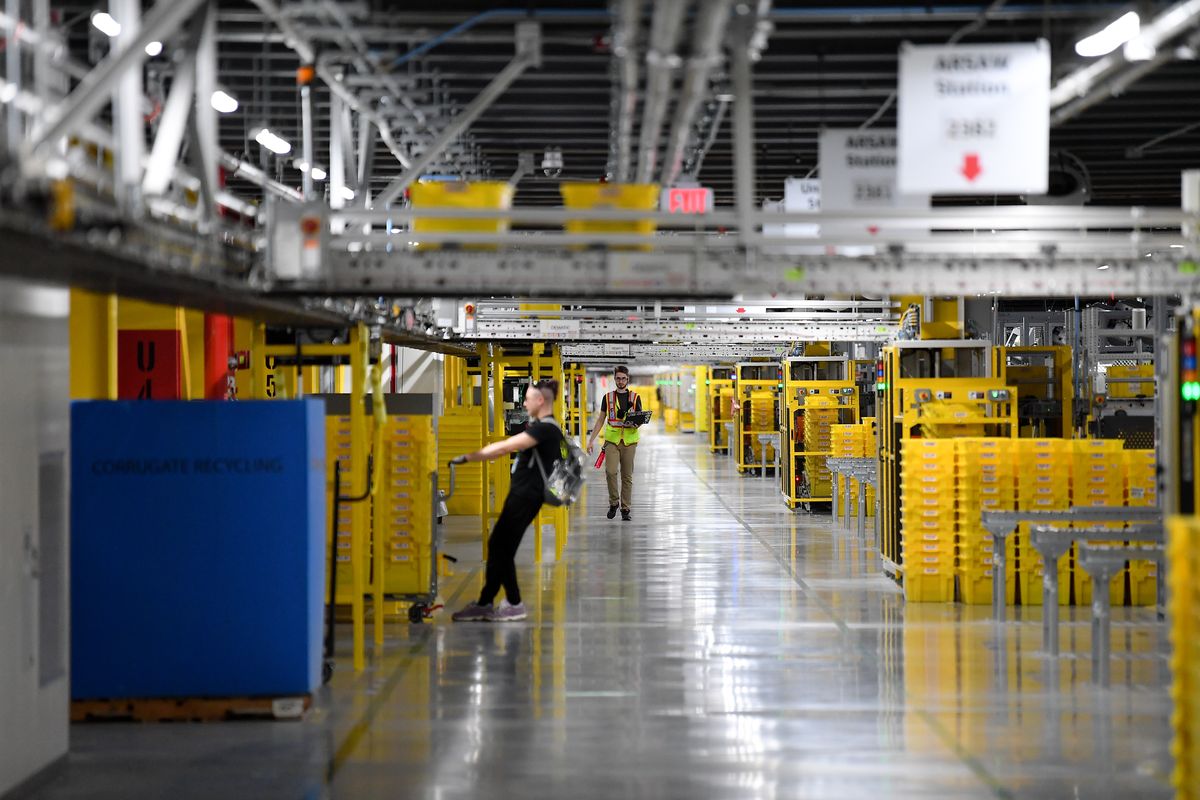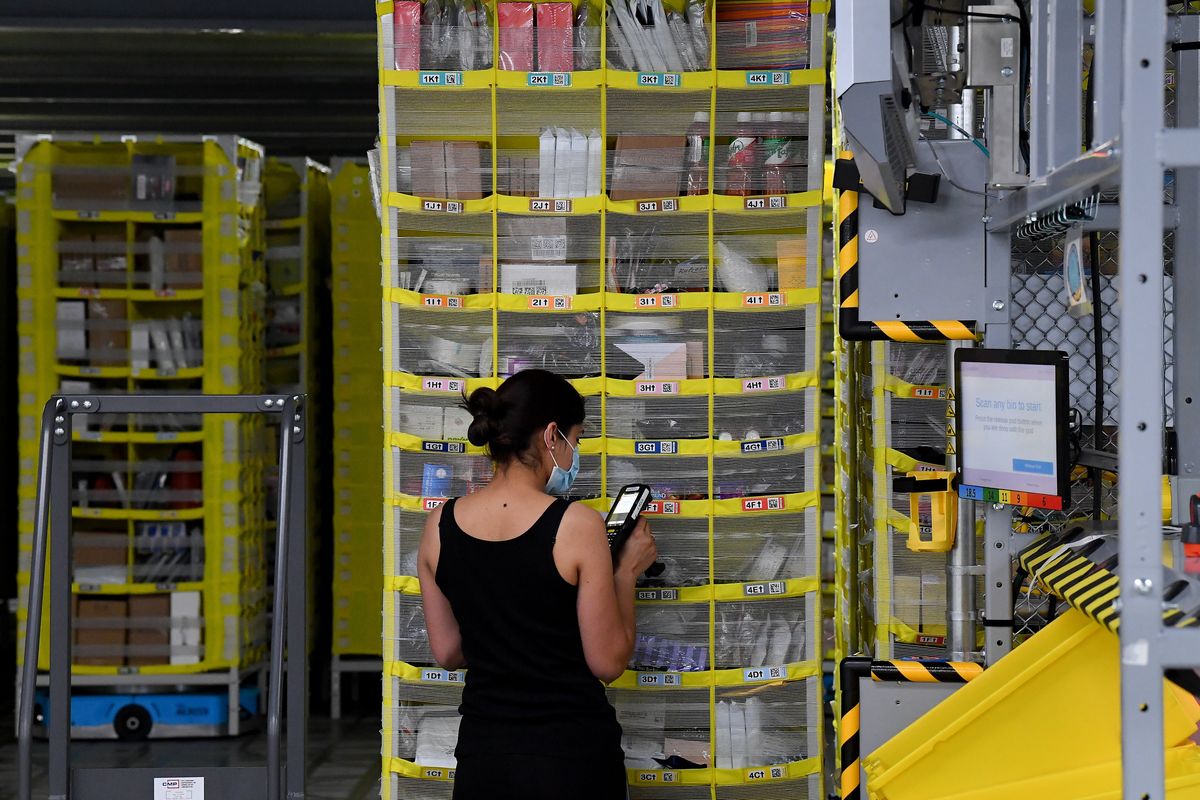Price gouging case against Amazon can proceed
Employees work at Amazon’s Airway Heights fulfillment center on June 7, 2021. (Tyler Tjomsland/The Spokesman-Review)Buy a print of this photo
Washington’s Supreme Court ruled earlier this month in favor of consumers who say they were victims of price gouging on Amazon’s digital store at the start of COVID-19 lockdowns.
Seven Washington Supreme Court justices determined that the price-gouging allegations against Amazon could constitute an “unfair” business practice under Washington’s Consumer Protection Act, opening the door for a proposed class-action lawsuit against the company to move forward.
That’s significant because, unlike most states, Washington does not have a statute preventing excessive price increases in times of emergency, like the aftermath of a natural disaster or a global pandemic.
Amazon, which said during the height of the pandemic lockdowns that it doesn’t tolerate price gouging, argued in court that Washington’s Consumer Protection Act did not apply in this case because it did not explicitly prohibit price gouging.
A decision on the act’s parameters is “best fit for the Legislature,” it argued.
But, in a majority opinion filed August 8, Washington’s Supreme Court Justices wrote that Amazon’s arguments were “unpersuasive” and “unconvincing.”
The filings do not make a conclusive determination on whether Amazon did in fact raise prices excessively – harming consumers and reaping what plaintiffs called “blockbuster profits” – but they may pave the way for that determination.
“The court went writ large and said there’s many ways you can allege an unfair practice, and this was one of them,” said Steve Berman, a Seattle attorney with Hagens Berman representing consumers in this case.
Following the Supreme Court’s ruling, the case will go back to district court and a jury will litigate the price gouging allegations, Berman said.
The attorneys have asked for class action status, meaning it would cover any shopper who overpaid for an item on Amazon during the time when a state of emergency was in place.
But, the Supreme Court’s decision already set a precedent, Berman continued.
It gives shoppers “protection from this kind of conduct,” he said. “I think the law was always there but now the Supreme Court has just affirmed that.”
Amazon did not respond to several requests for comment for this story.
In a March 2020 blog post, amid pandemic-induced lockdowns, Amazon said it had already taken steps to combat price gouging on its platform, including removing more than “half a million” offers from its store due to coronavirus-based price gouging and suspending more than 3,900 seller accounts in the U.S. for violating the company’s fair pricing policies.
“Amazon has zero tolerance for price gouging and longstanding policies and systems to prevent this harmful practice,” the company wrote.
The state Supreme Court was responding to a complaint filed in U.S. District Court for the Western District of Washington state in October 2021.
Five plaintiffs from California, Arizona and North Carolina alleged Amazon jacked up prices on goods they could not reasonably find on other e-commerce sites, at a time when they couldn’t easily leave their house to go check other stores.
In March and April 2020, the plaintiffs allege they overpaid for cleaning supplies, distilled water, dry yeast, ramen noodles and ingredients to make hand sanitizer.
Some plaintiffs had health and safety concerns that put them at high risk if they caught the COVID-19 virus; others were trying to buy supplies for loved ones who had trouble tracking down the things they needed.
Amazon controlled the price of its own goods and those sold by third-party merchants on its platform, the lawsuit alleged.
The e-commerce giant was also the only party that benefited from the price increases, it continued.
The district court kicked some of the legal questions in the case up to the state Supreme Court in April 2023.
In court filings last Thursday, seven justices determined Washington’s Consumer Protection Act did apply to the price gouging allegations.
Five justices went so far as to determine that, if the plaintiffs’ allegations were true, Amazon had violated the Consumer Protection Act.
They wrote in the majority opinion that plaintiffs had shown the price gouging caused substantial financial harm that could not be reasonably avoided and that was not “outweighed” by other benefits to shoppers or e-commerce industry competition.
“They have shown that Amazon’s actions had widespread impacts and that Amazon is responsible for the price increases on its own products as well as products supplied by third parties,” the justices wrote in the majority opinion. “They had no meaningful choice but to purchase their products from Amazon…”
Amazon’s argument that the Consumer Protection Act does not apply “conflicts with the stated intent of the (law), which is to ‘protect the public and foster fair and honest competition,’ ” the justices continued.
Justice Helen Whitener wrote the majority opinion, joined by justices Steven González, Raquel Montoya-Lewis, Debra Stephens and Mary Yu.
Justice Barbara Madsen wrote in a concurring opinion that the Consumer Protection Act did apply, but that the Supreme Court did not need to go so far as determining if Amazon had violated the law.
Judge David Keenan wrote in a second concurring opinion, joined by Justices Yu and Montoya-Lewis, that the Consumer Protection Act also covers “reasonable business practices.”
Keenan, a King County Superior Court judge, is serving as justice pro tempore, or a temporary justice, in this case.
The concurring opinion was meant to dispute Amazon’s claims that using the Consumer Protection Act in this instance would lead to “price controls,” and make it more difficult for Amazon to equalize supply and demand.
In the majority opinion, the justices declined to set a 15% price increase as the bar for an “unfair” business practice because that goes “beyond this court’s wheelhouse.”
Such a threshold is better determined by the Legislature because it depends on “numerous social and economic considerations,” they continued.
In a dissenting opinion, two justices used a similar argument to assert that the Consumer Protection Act did not apply in this case.
The law does not direct the court to determine what business practices are unfair without looking at other market factors, which is a job better suited for the Legislature than the Supreme Court, the justices wrote.
“I do not think that we should be the first court in the nation to create a price gouging claim based on general statutory language prohibiting ‘unfair … acts’ in trade or commerce,” Justice Sheryl Gordon McCloud wrote in the dissenting opinion, joined by Justice Charles Johnson.
Berman expects the trial won’t start for another two years.
In the meantime, he said he’s planning to ask Amazon how it is defining price gouging when it comes to third-party sellers and comparing that to the company’s own products.
If a jury rules in favor of the shoppers, those who overpaid would be mailed a refund, Berman said.
And Amazon, if the jury decides the way Berman hopes, “they’re going to be much more careful in the future.”

